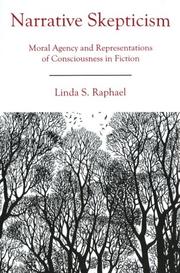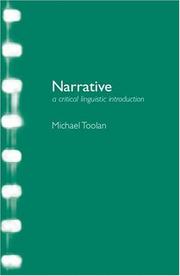| Listing 1 - 10 of 56 | << page >> |
Sort by
|

ISBN: 0838639003 Year: 2001 Publisher: Madison Teaneck : Cranbury London Mississauga : Farleigh Dickinson University press Associated University presses,
Abstract | Keywords | Export | Availability | Bookmark
 Loading...
Loading...Choose an application
- Reference Manager
- EndNote
- RefWorks (Direct export to RefWorks)
Using narrative, philosophical, and psychoanalytic theory, Linda S. Raphael investigates the development of skepticism in narrative. She argues that as authors explore more deeply the inner life of characters, their narratives become more skeptical about pinning down what it means to lead a good life. This argument is buttressed through a close examination of Jane Austen's Persuasion, George Eliot's Middlemarch, Henry James's The Wings of the Dove, Virginia Woolf's Mrs. Dalloway, and Kazuo Ishiguro's The Remains of the Day.
ANALYSE DU DISCOURS NARRATIF --- LITTERATURE --- PHILOSOPHIE --- ANALYSE DU DISCOURS NARRATIF --- LITTERATURE --- PHILOSOPHIE

ISBN: 0415231744 0415231752 9780415231756 Year: 2005 Publisher: London : Routledge,
Abstract | Keywords | Export | Availability | Bookmark
 Loading...
Loading...Choose an application
- Reference Manager
- EndNote
- RefWorks (Direct export to RefWorks)
Narrative explores a range of written, spoken, literary and non-literary narratives. It shows what systematic attention to language can reveal about the narratives themselves, their tellers, and those to whom they are addressed. Topics examined include plot structure, time manipulations, point of view, oral narratives and children's stories. This classic text has been substantially rewritten to incorporate recent developments in theory and new technologies, and to make it more usable as a course book. New materials include sections on film, surprise and suspense, and online news stories. The section on children's narratives has been updated, and the discussion of newspaper stories incorporates contemporary examples. There are new exercises which relate closely to the chapter content and new sections on further reading.
Book
ISBN: 9781119052142 1119052149 9781119052142 1119052149 Year: 2019 Publisher: Hoboken: Wiley Blackwell,
Abstract | Keywords | Export | Availability | Bookmark
 Loading...
Loading...Choose an application
- Reference Manager
- EndNote
- RefWorks (Direct export to RefWorks)
Featuring contributions from leading scholars in the field, The Handbook of Narrative Analysis is the first comprehensive collection of sociolinguistic scholarship on narrative analysis to be published:-Organized thematically to provide an accessible guide for how to engage with narrative without prescribing a rigid analytic framework.-Represents established modes of narrative analysis juxtaposed with innovative new methods for conducting narrative research.-Includes coverage of the latest advances in narrative analysis, from work on social media to small stories research.-Introduces and exemplifies a practice-based approach to narrative analysis that separates narrative from text so as to broaden the field beyond the printed page.
Linguistique --- Analyse du discours narratif --- Analyse de la conversation
Multi
ISBN: 041531657X Year: 2004 Publisher: London : Routledge,
Abstract | Keywords | Export | Availability | Bookmark
 Loading...
Loading...Choose an application
- Reference Manager
- EndNote
- RefWorks (Direct export to RefWorks)
Following the more recent development of cultural studies, narratology is currently enjoying a kind of comeback due to its long history of engaging non-literary objects. In the 1990s and up to the present, the increasing attention to visual culture has opened up a dialogue between narratology and visual art, which has been made indispensable by the flourishing development of film studies courses. Narrative theory therefore has relevance for a wide number of academic disciplines, including: anthropology; communication; cultural and media studies; history; organization studies; philosophy; post-colonial studies; religious studies and women's/gender studies. This set of volumes reprints essential papers on the history, breadth, and applicability of narrative theory. The collection includes articles from the leading names of narrative theory, such as Roland Barthes, Mikhail Bakhtin, Tzvetan Todorov and Jean-Françoise Lyotard, as well as lesser-known, though equally important, contributions.
Book
ISBN: 9781472445230 Year: 2015 Publisher: Farnham ; Burlington : Ashgate,
Abstract | Keywords | Export | Availability | Bookmark
 Loading...
Loading...Choose an application
- Reference Manager
- EndNote
- RefWorks (Direct export to RefWorks)
In spite of their differing rhetorics and cognitive strategies, sociology and literature are often concerned with the same objects: social relationships, action, motivation, social constraints and relationships, for example. As such, sociologists have always been fascinated with fictional literature. This book reinvigorates the debate surrounding the utility of fiction as a sociological resource, examining the distinction between the two forms of writing and exploring the views of early sociologists on the suitability of subjecting literary sources to sociological analysis. Engaging with contemporary debates in this field, the author explores the potential sociological use of literary fiction, considering the role of literature as the exemplification of sociological concepts, a non-technical confirmation of theoretical insights, and a form of empirical material used to confirm a set of theoretically oriented assumptions. A fascinating exploration of the means by which the sociological eye can be sharpened by engagement with literary sources, Fiction and Social Reality offers a set of methodological principles according to which literature can be examined sociologically. As such, it will appeal to scholars of sociology and literary studies with interests in research methods and interdisciplinary approaches to scholarly research.
Littérature et société. --- Roman --- Analyse du discours narratif. --- Aspect social.
Book
ISBN: 9783039111213 Year: 2008 Publisher: Oxford : Peter Lang,
Abstract | Keywords | Export | Availability | Bookmark
 Loading...
Loading...Choose an application
- Reference Manager
- EndNote
- RefWorks (Direct export to RefWorks)
Methods of representing individual voices were a primary concern for Geoffrey Chaucer. While many studies have focused on how he expresses the voices of his characters, especially in The Canterbury Tales, a sustained analysis of how he represents his own voice is still wanting. This book explores how Chaucer's first-person narrators are devices of self-representation that serve to influence representations of the poet. Drawing from recent developments in narratology, the history of reading, and theories of orality, this book considers how Chaucer adapts various rhetorical strategies throughout his poetry and prose to define himself and his audience in relation to past literary traditions and contemporary culture. The result is an understanding of how Chaucer anticipates, addresses, and influences his audience's perceptions of himself that broadens our appreciation of Chaucer as a master rhetorician.
Chaucer, Geoffrey (1340?-1400) --- Soi --- Analyse du discours narratif --- Personnages --- Style littéraire --- Dans la littérature
Book
ISBN: 9781405184380 Year: 2008 Publisher: Malden Oxford : Blackwell,
Abstract | Keywords | Export | Availability | Bookmark
 Loading...
Loading...Choose an application
- Reference Manager
- EndNote
- RefWorks (Direct export to RefWorks)
What happens next? Narrative theory, regardless of the discipline to which it is applied, is rich and varied, accommodating a wealth of what may at first appear to be contrasting views going in different directions, sometimes contradicting the naive idea that narrative is plot. In this collection of 35 of the best pieces of work in the field, contributors demonstrate as well as describe both the complexity and the elegance of theory as it relates to literature, music and art in such topics as the resurrection of the implied author, unreliable narration, what narratology and stylistics can do for each other, multiple trajectories in such as Ulysses, spatial poetics, self-consciousness, method, rhetoric, and applications beyond the literary in law, music, media and art.
Narration (Rhetoric). --- Literaire kritiek. --- Literaire retoriek. --- Literaire theorie. --- Narratologie. --- Analyse du discours narratif --- Narration
Book
ISBN: 9783111307107 Year: 2023 Publisher: Berlin ; Boston : de Gruyter,
Abstract | Keywords | Export | Availability | Bookmark
 Loading...
Loading...Choose an application
- Reference Manager
- EndNote
- RefWorks (Direct export to RefWorks)
Analyse du discours narratif --- Narration --- Platonisme. --- Philosophie. --- Platon --- Critique et interprétation.
Book
ISBN: 9783110316346 9783110316469 9783110382075 311031634X 3110316463 3110382075 Year: 2014 Publisher: Berlin De Gruyter
Abstract | Keywords | Export | Availability | Bookmark
 Loading...
Loading...Choose an application
- Reference Manager
- EndNote
- RefWorks (Direct export to RefWorks)
This handbook provides a systematic overview of the present state of international research in narratology and is now available in a second, completely revised and expanded edition.Detailed individual studies by internationally renowned narratologists elucidate central terms of narratology, present a critical account of the major research positions and their historical development and indicate directions for future research.
Fiction --- Literary rhetorics --- Analyse du discours narratif --- Narration --- Analyse du discours narratif. --- Narration. --- Discourse analysis, Narrative --- Narration (Rhetoric) --- Discourse analysis, Narrative. --- Narrative (Rhetoric) --- Narrative writing --- Rhetoric --- Narratees (Rhetoric) --- Narrative discourse analysis --- Literary Theory. --- Narratology.
Book
ISBN: 9783110259957 Year: 2012 Publisher: Berlin ; Boston : de Gruyter,
Abstract | Keywords | Export | Availability | Bookmark
 Loading...
Loading...Choose an application
- Reference Manager
- EndNote
- RefWorks (Direct export to RefWorks)
Recent postclassical narratology has constructed top-down reading models that often remain blind to the frame-breaking potential of individual literary narratives. Narrative, Interrupted goes beyond the macro framing typical of postclassical narratology and sets out to sketch approaches more sensitive to generic specificities, disturbing details and authorial interference. Unlike the mainstream cognitive approaches or even the emergent unnatural narratology, the articles collected here explore the artifice involved in presenting something ordinary and realistic in literature. The first section of the book deals with anti-dynamic elements such as dialogue, details, private events and literary boredom. The second section, devoted to extensions of cognitive narratology, addresses spatiotemporal oddities and the possibility of non-human narratives. The third section focuses on frame-breaking, fragmentarity and problems of authorship in the works of Vladimir Nabokov. The book presents readings of texts ranging from the novels of Don DeLillo and Thomas Pynchon to the Animal Man comics. The common denominator for the texts discussed is the interruption of the chain of events or of the experiential flow of human-like narrative agents.
Analyse du discours narratif --- Narration --- Littérature --- Discourse analysis, Narrative. --- Narration (Rhetoric) --- Literature --- Histoire et critique --- History and criticism --- Theory, etc. --- Narration. --- Histoire et critique. --- Analyse du discours narratif. --- Littérature
| Listing 1 - 10 of 56 | << page >> |
Sort by
|

 Search
Search Feedback
Feedback About UniCat
About UniCat  Help
Help News
News